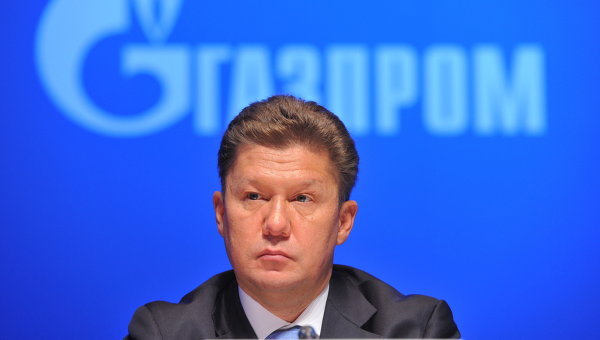
Russia’s Gazprom Seems Set to Return to Georgia
Publication: Eurasia Daily Monitor Volume: 12 Issue: 190
By:

For the last several weeks, political life in Tbilisi has been largely dominated by ongoing negotiations between the governments of Russia and Georgia regarding Russian natural gas giant Gazprom’s large-scale return to the Georgian market. The news of these negotiations first broke on September 26, when Gazprom CEO Alexei Miller and Georgian Energy Minister Kaha Kaladze (who also serves as a deputy prime minister) met in Brussels (Gazprom.ru, Pirveliradio.ge, September 26).
The Georgian government first tried to deny the news as Prime Minister Irakli Garibashvili and some cabinet members issued convoluted and contradictory statements (Timer.ge, Newposts.ge, October 13). Eventually, however, Energy Minister Kaladze confirmed, on October 10, that the negotiations indeed were taking place and that they were intended to increase the supply of Russian natural gas to Georgia (Rustavi 2, Channel 1, October 1).
Georgia does not have any of its own natural gas reserves and, subsequently, entirely imports this resource from abroad. The question of where Georgia’s gas would come from, therefore, has always been crucial. Nevertheless, bilateral negotiations over the increase of gas supplies from one country to another would not be a source of much controversy had it not been for Gazprom’s notorious international reputation as an unreliable supplier and, in particular, due to Georgia’s own bitter experience with this Russian state-owned energy giant. It is widely known that Moscow uses its natural gas supplies as a tool of geopolitical blackmail and subversion against consumer countries. Most notably, Ukraine and the European Union already experienced this several times; ever since, the EU has explored ways to reduce its dependence on unreliable and expensive Russian natural gas (Margarita Assenova (ed.), Azerbaijan and the New Energy Geopolitics of Southeastern Europe, The Jamestown Foundation, 2015; Ecfr.eu, March 17).
Georgia’s experiences with Gazprom have been even worse. In 2006, Russia almost doubled the price it charged Georgia for its gas, from $63 to $110 per 1,000 cubic meters (Civil Georgia, January 16, 2006). Moreover, in January 2006, an explosion took offline the Russian-Georgian natural gas pipeline, which disrupted vital gas supplies to Georgia in the middle of a harsh winter. Tbilisi firmly blamed the explosion on Moscow, accusing it of trying to undermine the pro-Western Georgian government of Mikheil Saakashvili (Radiotavisupleba.ge, January 24, 2006).
Since 2006, then-president Saakashvili’s administration made concerted efforts to end Georgia’s dependence on Russian natural gas. And to Saakashvili’s credit his administration largely succeeded in this (Civil Georgia, June 21, 2006). Currently, 1.211 billion of the 2.177 billion cubic meters of natural gas that Georgia uses annually comes from Azerbaijan. Georgia receives another 686 million cubic meters via the South Caucasus Pipeline (SCP). Only about 268 million cubic meters of Georgian gas is still imported from Russia (Civil Georgia, October 20, 2015). Hence, Azerbaijan emerged as Georgia’s key supplier. So far, Baku has proved to be a reliable partner, not least owing to its geographic proximity and to the steady market benefits this economic relationship accrues to Azerbaijan and its ruling elites.
Considering the troubled history Georgia has had with Russia regarding natural gas purchases—not to mention decades of conflict and outright war in 2008—the Georgian government’s negotiations on increase gas deliveries from Russia seem confusing, if not irrational. After all, knowing this problematic past, why is the government voluntarily reverting to these old, dangerous practices that left Georgia vulnerable to coercion from Moscow and without natural gas in the freezing winter? Two possible answers to this question exist: First, Moscow might have actually applied pressure on Tbilisi by sending threats via certain backchannels in order to push Georgia to agree to Gazprom’s return. As time passes, more evidence may emerge for this possibility. Second, a long-circulated narrative in Georgia notes that the ruling Georgian Dream (GD) coalition’s leader, billionaire Bidzina Ivanishvili, holds 1 percent of Gazprom’s stock. This rumor seems more credible now in light of the most recent developments (Tabula.ge, October 10).
Whatever is the real cause of the ongoing talks about boosting Gazprom’s sales to the Georgian market, such an outcome cannot be good news for Georgia. Yet, Georgia’s leaders do not see this situation in a negative way. For instance, Deputy Energy Minister Ilia Eloshvili somewhat naively stated that larger purchases from Gazprom were necessary to diversify Georgia’s natural gas supplies (Civil Georgia, October 10). Whereas, Georgian Energy Minister Kaladze further justified his government’s engagement with Russia by the need to meet Georgia’s increased demand for gas in the face of depleting Azerbaijani gas reserves (Channel 1 TV, October 10). However, neither Kaladze, nor Eloshvili, nor anyone in the current Georgian government seem to be questioning whether Russia will stick to the role of a benign, supplementary supplier and play by the legal rules of the Georgian market. Most likely, Moscow will rather attempt to further increase its share of gas exports to Georgia and, eventually, monopolize the Georgian market entirely, a position that it held unchallenged until 2006. Moreover, judging from past experiences, Russia will not be a reliable supplier. Almost certainly, the Kremlin will continue to use natural gas to blackmail and subvert Georgia for years to come.
As Russian-Georgian negotiations over natural gas sales continue, Georgia’s current leaders are committing a serious political blunder that promises to have far-reaching political and economic consequences for the small South Caucasus country. So far, however, they have yet to realize the negative potential of their actions.




